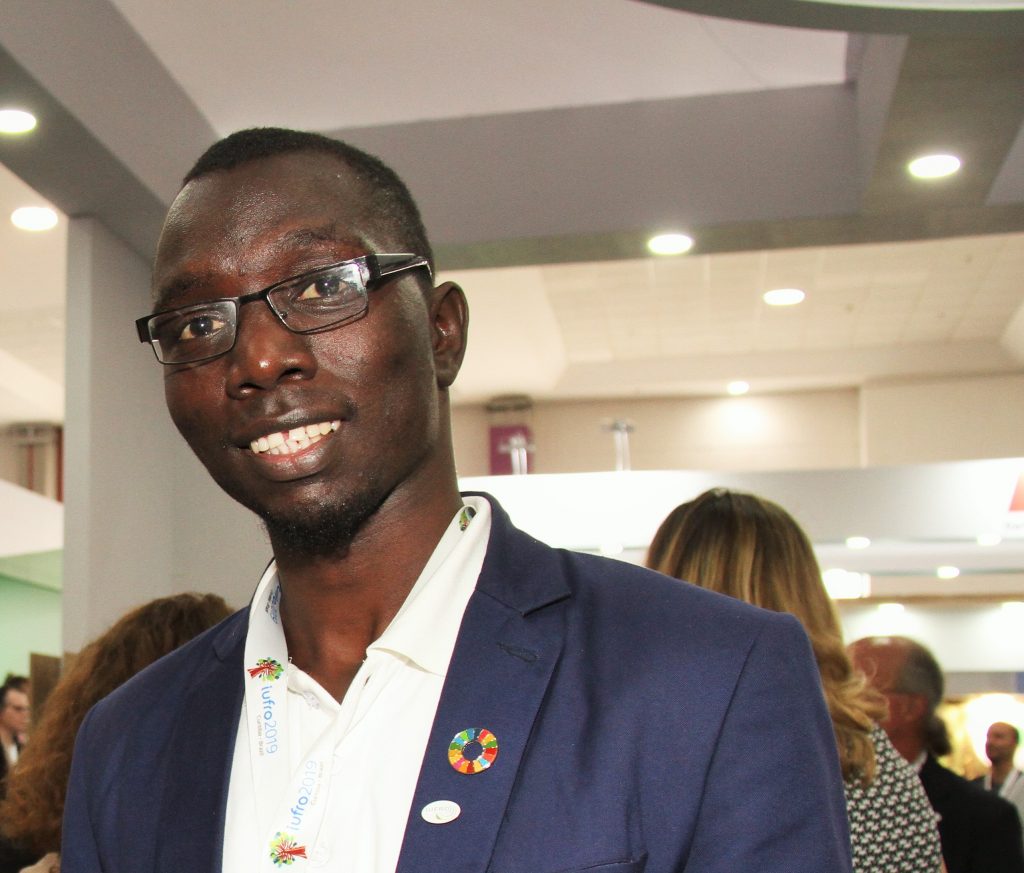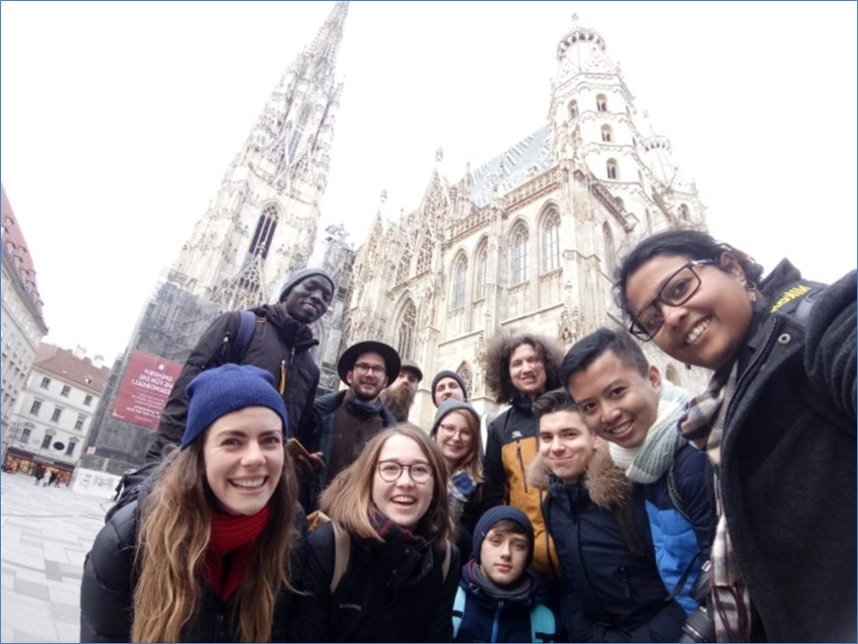Interview with IFSA President Amos Amanubo

Amos is a 25 year old Ugandan and a recent graduate from Makerere University, Kampala, holding a Bachelor’s Degree in Conservation Forestry and Production Technology. He has been the President of the International Forestry Students’ Association (IFSA) since August 2019. His favorite pastimes are cycling through natural landscapes and meeting friends.
Why did you choose to study forestry?
I grew up witnessing an unappealing trajectory, a transition from once heavily forested landscapes on which the livelihoods of my community depended, to now barely forested landscapes which hardly sustain livelihoods. This presented to me the opportunity to be part of a solution to a problem.
Are there many forestry students in your country?
Relative to other programs, there are very few forestry students in my country and much fewer females than males in this discipline.
Why should anyone study forestry?
It is the diversity, providing one with the opportunity to specialize in any field and learn new things whilst directly solving relevant problems that affect the world now and into the future. If we look at the current global environmental challenges such as deforestation, biodiversity loss, and climate change, for example, I can’t imagine a better time to study forestry to be part of a solution to a problem that threatens the future of humanity and the planet.
What are the job perspectives as a graduated forester in your country?
They are moderate to high, depending on experience. The prospects range from the renewable energy sector to NGOs/INGOs working in shelter and livelihoods, private small scale forest tree seedling enterprises, commercial forest plantation management, environment and biodiversity conservation, and research NGOs.
How are your own studies affected by the corona-virus pandemic?
In a country that has been under a massive lockdown, academic institutions have been closed and studies put to a complete halt. As a developing country (LDC), there is no possibility of conducting studies efficiently in the virtual realm due to the low internet bandwidth.
How are IFSA activities affected by the pandemic?
IFSA has built a very strong sense of engagement around physical events, both internal events and external science-policy events. These events maintain the IFSA spirit of togetherness, create learning and networking opportunities and further the voice of young people on policy platforms. With travel restrictions, these opportunities and the values associated with physical engagement have been heavily limited.
What are you doing to keep the spirits high among IFSA students?
IFSA is blessed with an audience demographic (mainly young people) that are well acquainted with this era of digital communication. We have maintained our online presence through regional coffee hours, social media engagement of our members, and have moved on to hold our Annual Regional Meetings online. We also have a Covid-19 Task Force that is particularly positioned to update our members on new developments.
What, in the light of the current crisis, do you see as the major strengths and weaknesses of IFSA?
Strengths: A highly flexible and diverse network well-versed with digital communication technology makes it is easy for IFSA to maintain a relevant and functional presence for most of the part, globally. Also being a student-led voluntary network, the ability and resilience to maintain its local and international presence and contribute fundamentally to global forest education development projects whilst concurrently running its own education transformation initiatives, is an incredible strength.
Weakness: IFSA is a network whose spirit is mostly kept going through engagements at physical meetings and events that brings the connectedness and highlights the cultural richness and also learning through event based initiatives. Such a spirit is certainly difficult to maintain during such times of crisis with no physical events.
What threats and opportunities to you see for IFSA in this situation?
Threats: Given our international geographic coverage and noting that some of our membership is in developing countries that may have a low internet bandwidth, it may sometimes be difficult to reach information and engage members in these countries through the virtual realm.
Opportunities: Since physical events are usually accessible to few people due to capacity reasons, this situation provides us with the opportunity to engage a higher number of our membership in events that have since then moved online, without resource and capacity limitation.
After having established a Carbon and sustainability sub-commission, this is a massive opportunity for IFSA to cut down its carbon footprint which was mainly from travels. It is also an opportunity to further adequately test the efficiency of our online engagement, which we aim to maintain even after the crisis.
How do you see the cooperation between IFSA and IUFRO?
The cooperation between IFSA and IUFRO is one of mutual benefit that has produced a lot of incredible results in enhancing forest education, with IFSA bringing students and youth perspectives and experiences to IUFRO, and IUFRO contributing to shaping the professional experience and exposure of IFSA members directly through trainings and indirectly through engagement at IUFRO events.
Having successfully collaborated on joint forest education development projects previously, it is imperative to explore prospective similar joint projects in order to continue enhancing forest education and also promoting exchanges at physical and online meetings and events. With a strong background in voluntary work, both organizations can explore avenues of exchanging capacity to support the work of each other.

What do you consider to be the greatest challenge for the future?
With IFSA the greatest challenge is the growing network/membership which may need more resources and capacity to sustain and coordinate. Balancing this demand with the voluntary nature of the network is certainly a challenge.
The overall challenge for the future is to make the world realize the true value of forests besides other ecosystems, the ecosystem goods and services they provide and to maintain these values for the benefit of humans and nature. Also, then acknowledging the jeopardy of human future without these values and services. We will get there soon.
What is your greatest hope for the future?
To see that humans and nature are reconciled, acknowledging that their existence is not mutually exclusive, heeding to both scientific and indigenous knowledge to inform resource use behavior and also seeing the bioeconomy rising through to a rank higher than the fossil economy, with forestry as a leading drive of socioeconomic development and environmental sustainability.
Is there a positive proverb or famous quote that you would like to share with us?
“It is not the shoes we wear, but the steps we take, that get us where we want to be (Anonymous)
Do have an inspiring role model who you follow?
Apart from the admiration I have for every forester, former IUFRO President Prof. Mike Wingfield stands out as an inspiring role model for me because of his matchless achievements, leadership, wisdom and approachability, as well as the incredible contributions he has made to the forestry sector and the body of knowledge in forest sciences.
– Thank you, Amos!

Leave a Reply